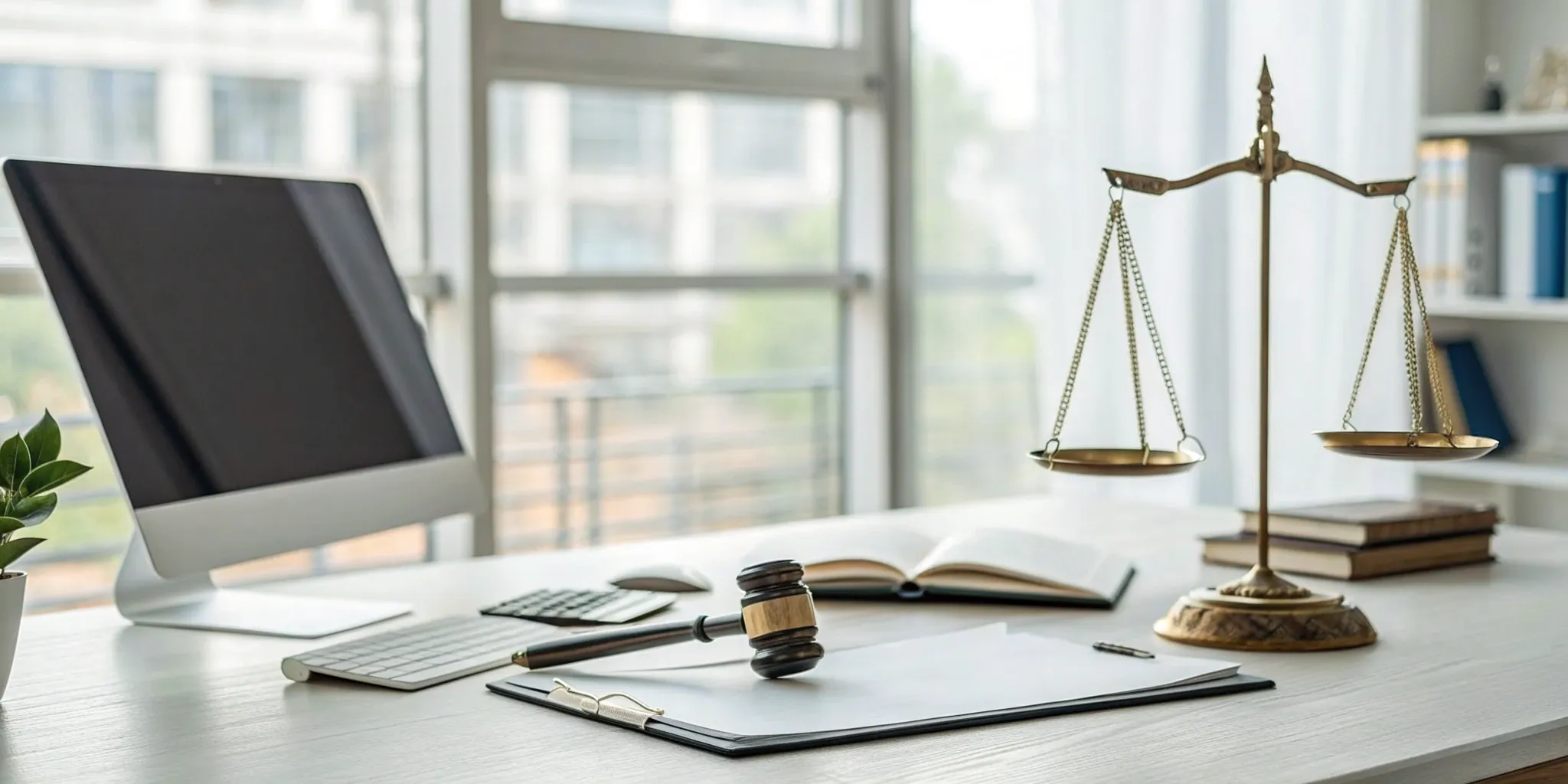Selecting legal representation is a serious business decision. You need a professional with a proven track record, the right expertise for your specific situation, and a communication style that works for you. Your initial consultation is your opportunity to vet your candidates and ensure you’re making a sound investment in your case’s future. The most effective way to do this is by arriving with a clear set of inquiries. We’ve compiled the most critical questions to ask a lawyer to help you assess their qualifications, clarify costs, and understand their proposed strategy, so you can hire with total confidence.
Key Takeaways
- Ask about their specific experience and track record: Go beyond their credentials and inquire about their history with cases similar to yours. A lawyer’s past results are a strong indicator of their ability to handle your specific legal situation.
- Get a crystal-clear breakdown of all fees and costs: Have a direct conversation about money from the start. You need to understand the attorney’s fee structure and any other case-related expenses before you commit, ensuring there are no financial surprises.
- Understand their strategy and communication plan: Ask for their honest assessment of your case—including potential challenges—and how they plan to approach it. Also, establish how and when you’ll receive updates to ensure you’re always kept in the loop.
Ask About Their Experience and Qualifications
Choosing a lawyer is one of the most important decisions you’ll make for your case. Think of it as hiring a key partner for a difficult project. You need someone with the right skills, a solid background, and a working style that fits with yours. Before you commit, it’s essential to do your homework and ask direct questions about their professional history. This isn’t about being difficult; it’s about being a smart consumer and a strong advocate for yourself.
A good lawyer will welcome your questions and be transparent about their qualifications. They understand that trust is the foundation of a successful attorney-client relationship. If an attorney seems evasive or dismissive of your questions, that’s a major red flag. You’re looking for a professional who is not only capable but also makes you feel confident and heard. The following questions will help you understand who you’re hiring and whether they are the right fit to handle the specifics of your legal situation. At Counsel Hound, we ensure every client is connected with a highly-qualified attorney from our trusted network, so you can feel secure from the very first conversation.
What is their educational background?
First things first, you want to confirm that the lawyer has the fundamental credentials. This is a basic but crucial step. You can ask where they went to law school and when they were admitted to the bar. This information confirms they have the necessary education and are legally authorized to practice law in your state. While a degree from a top-tier school can be impressive, what matters most is that they are a licensed and respected member of the legal community. Don’t be shy about this; it’s a standard part of the vetting process and ensures you’re placing your trust in a qualified professional.
Do they have experience with cases like yours?
This is perhaps the most critical question you can ask. The law is incredibly vast, and most attorneys specialize in specific areas. You wouldn’t see a heart surgeon for a broken foot, and the same logic applies here. Ask them directly about their experience with cases similar to yours. For instance, if you were harmed by a faulty medical device, you need an attorney with a deep understanding of defective products litigation, not just general personal injury. Inquire about how many similar cases they’ve handled and what the outcomes were. This helps you gauge their familiarity with the specific laws, procedures, and potential challenges relevant to your situation.
What is their professional reputation?
An attorney’s reputation is built on their track record. You’re looking for someone with a history of achieving positive outcomes for their clients. Ask about their past case results and look for testimonials or reviews from former clients. A lawyer with a strong reputation is often respected by judges and opposing counsel, which can be a significant advantage. While past success doesn’t guarantee a future outcome, it does demonstrate their competence and ability to handle complex legal fights. A proven history shows they have the experience to build a strong case on your behalf.
How will they manage your case and communicate with you?
Understanding how your lawyer will work with you is key to a smooth and less stressful experience. Ask about their communication style. Do they prefer email or phone calls? What is their typical response time? You should also find out who your primary point of contact will be—the lawyer themselves or a paralegal. Clear, consistent communication is vital. You need to feel confident that you will be kept informed about important developments in your case. This conversation sets expectations from the start and helps ensure you and your legal team are always on the same page.
Clarify the Legal Fees and Costs
Talking about money can be uncomfortable, but it’s one of the most important conversations you’ll have with a potential lawyer. You need a crystal-clear understanding of all potential costs before you sign anything. A trustworthy attorney will be upfront about their fees and welcome your questions. Don’t be shy—your financial peace of mind is on the line.
Many people worry they can’t afford legal help, especially when dealing with lost wages and medical bills. That’s why some firms, including Counsel Hound, work on a contingency basis. This means you don’t pay any attorney’s fees unless you win your case. It’s a model designed to help people get justice, regardless of their financial situation. When you have your initial consultation, make sure the fee structure is explained in a way you completely understand.
How do they structure their fees?
One of the first questions to ask is how the lawyer gets paid. Many law firms require an upfront payment called a retainer, which is essentially a down payment on their time. You’ll want to know if this is a flat fee for the entire case or if they bill against it at an hourly rate. A different and common approach in personal injury cases is the contingency fee agreement.
With a contingency fee, the lawyer’s payment is a percentage of the money they recover for you. If they don’t win your case, you don’t owe them attorney’s fees. This structure ensures your lawyer is motivated to get you the best possible outcome. At Counsel Hound, we operate on a “no fees until we win” basis because we believe everyone deserves access to quality legal representation.
What other costs should you expect?
Beyond the attorney’s fees, a lawsuit involves other expenses. These are often called “case costs” and can include court filing fees, charges for obtaining medical records, payment for expert witnesses, and even mailing and copying expenses. It’s crucial to ask who is responsible for covering these costs as the case progresses.
Will these expenses be deducted from your final settlement? Does the firm cover them upfront? Understanding how these costs are handled prevents surprises down the road. For example, a case involving a defective product might require testimony from an engineering expert, which can be a significant expense. A good lawyer will outline these potential costs for you from the start.
What are the payment options?
If you’re working with a lawyer who charges a retainer or hourly fee, you should ask about payment flexibility. If the initial retainer runs out, will you need to pay another lump sum? Do they offer payment plans or installments if additional funds are required? Getting these details in writing can help you budget and avoid financial strain during an already stressful time.
The beauty of a contingency fee arrangement is its simplicity. You don’t have to worry about monthly payments or finding money for a retainer. The attorney’s fees are simply deducted from the settlement or award at the very end. This straightforward approach allows you to focus on what matters most: your recovery.
How will they handle billing and expenses?
Regardless of the fee structure, you have a right to know how your money—or your potential settlement money—is being spent. Ask if you will receive regular, itemized statements. For hourly billing, this statement should detail the work performed and the time spent. For contingency cases, you should still be able to request updates on the case costs that have accrued.
Clear and consistent communication about finances is a hallmark of a professional and trustworthy law firm. You should never feel like you’re in the dark about the costs associated with your case. During your free consultation, we encourage you to ask us these specific questions. We are committed to complete transparency with our clients from day one.
Discuss Your Case and Their Strategy
Once you understand a lawyer’s background and how they handle fees, it’s time to talk specifics about your case. This conversation is your chance to see how they think and whether their approach aligns with your needs. A good attorney won’t just give you vague promises; they’ll provide a clear, honest assessment of the road ahead. Asking direct questions about their strategy helps you gauge their confidence, experience, and how they’ll handle the complexities of your situation. This is where you can truly determine if they are the right advocate to fight for you.
What is the expected timeline and potential outcome?
It’s completely reasonable to want a sense of what the future holds. Asking about the likely timeline and outcome helps you set realistic expectations from the start. A straightforward question like, “Based on your experience, what do you see as a potential outcome for my case, and how long might it take to get there?” can be very revealing. An experienced lawyer should be able to provide a general forecast based on similar cases they’ve handled. While no one has a crystal ball, their answer will give you insight into their confidence and help you mentally and emotionally prepare for the legal process ahead.
What are the strengths and weaknesses of your case?
An honest lawyer will give you the full picture, not just the parts they think you want to hear. You need to understand both the strong points of your case and any potential hurdles. Ask them directly, “What are the biggest strengths and weaknesses you see in my case?” This question shows you whether they are a transparent partner. A lawyer who can openly discuss challenges is one who is already thinking about how to overcome them. This is especially critical in complex personal injury claims, where every detail matters. Their answer will reveal their depth of experience and how prepared they are to build a solid case for you.
What legal strategies will they use?
Seeing how a lawyer thinks on their feet is one of the best ways to assess their skills. You can get a feel for their approach by asking how they would handle a specific, tricky part of your case. For example, you could say, “Here’s a complicated aspect of my situation. What would be your strategy for addressing it?” Listen for how they break down the problem and the solutions they propose. This gives you a window into their analytical abilities and whether they can create a thoughtful plan for difficult issues, such as those found in defective products litigation. You want a strategist, not just a lawyer.
How often will you receive updates?
Feeling left in the dark is one of the most frustrating experiences you can have during a legal case. That’s why setting communication expectations early on is so important. Ask the attorney, “How will you keep me updated on my case, and how often can I expect to hear from you?” Whether it’s a weekly email, a bi-weekly phone call, or another system, a clear plan ensures you won’t be left wondering what’s happening. A good legal team understands that you deserve to stay informed and will have a process in place to make sure you feel supported and engaged every step of the way.
Prepare for Your Initial Consultation
Your first meeting with a potential lawyer is a critical step. It’s your chance to determine if they’re the right fit for you and your case. Walking in prepared will help you make the most of this opportunity and feel confident in your decision. Think of it less as a meeting and more as an interview—where you’re the one doing the hiring. This mindset shift empowers you to ask the right questions and get the clarity you need to move forward.
What documents and information should you bring?
To give a lawyer a clear picture of your situation, you’ll want to bring all relevant documents. The more information you can provide, the better they can assess your case. Gather everything you have, including any police reports, medical records and bills, photographs of the incident or your injuries, and any correspondence with insurance companies. It’s also helpful to write down a detailed timeline of events while it’s still fresh in your mind. Don’t worry if you don’t have everything; just bring what you can. This preparation helps you effectively evaluate an attorney’s qualifications and gives them the tools to offer a meaningful assessment of your claim.
What should you ask about their approach?
This consultation is your opportunity to understand how the lawyer and their firm operate. Come prepared with a list of questions about their process. You should ask who will be the primary person handling your case—will it be the lawyer you’re meeting with or another associate? Inquire about their communication style and how often you can expect to receive updates. It’s also fair to ask about their initial thoughts on your case and what they see as a likely outcome. Learning about their approach will show you what it would be like to work with them and help you find a legal partner who aligns with your needs.
What happens during and after the meeting?
During the meeting, the lawyer will listen to your story and review your documents. Afterward, they should explain their fee structure clearly. Many people are concerned about upfront costs, and some lawyers do require a “retainer,” which is a lump sum paid at the start. However, at Counsel Hound, we believe you shouldn’t have to worry about legal fees while you’re recovering. We operate on a contingency basis, which means we offer a free consultation and there are no fees until we win your case. Be sure to ask for a copy of the fee agreement so you can review it carefully before making any commitments.
Get answers to your biggest concerns.
It’s completely normal to have fears or misconceptions about hiring a lawyer. One of the biggest myths is that it’s prohibitively expensive, while another is that lawyers make simple things overly complicated. Your initial consultation is the perfect time to voice these concerns. Be open about what’s worrying you, whether it’s about the cost, the timeline, or the complexity of your case. A good lawyer will listen and provide straightforward answers that put you at ease. Getting these issues out in the open will help you build a foundation of trust and ensure you feel comfortable with the legal path ahead, especially in complex cases like a medical injury claim.
Related Articles
- Counsel Hound: Your Trusted Personal Injury Law Firm | Counsel Hound
- Ultimate Guide to Choosing the Right Car Accident Lawyer in New York City | Counsel Hound
- Why Hire a Car Accident Injury Attorney After an Accident? | Counsel Hound
- 10 Steps to Finding the Right Car Accident Lawyer in Los Angeles | Counsel Hound
- Request A Free Consultation | Counsel Hound
Frequently Asked Questions
What if the lawyer I meet with isn’t the one who will actually handle my case? This is a fantastic and important question to ask. In many firms, it’s common for a team of legal professionals to work on a case, which can be a real strength. However, you have every right to know who your primary point of contact will be. During your initial consultation, you can ask directly who will be managing the day-to-day aspects of your case and who you should call with questions. A good firm will be transparent about their structure and ensure you feel comfortable with the team fighting for you.
I’m worried my case isn’t “big enough” to be worth a lawyer’s time. Should I still reach out? Absolutely. You should never try to judge the value or validity of your own case. What might seem minor to you could involve complex legal issues that a professional would immediately recognize. That’s precisely why firms like Counsel Hound offer free consultations. It gives you a no-risk opportunity to have an expert review the details of your situation. The only way to know for sure if you have a case is to ask.
What’s the real difference between “attorney’s fees” and “case costs”? It’s easy to get these two mixed up. Think of it this way: “attorney’s fees” are what you pay the lawyer for their time and expertise. In a contingency agreement, this is a percentage of the final settlement. “Case costs” are the out-of-pocket expenses required to move the case forward, such as court filing fees, expert witness payments, or the cost of obtaining medical records. It’s crucial to ask how both of these are handled before you sign an agreement.
How much will I actually have to be involved in my case? While your legal team handles the heavy lifting—like legal research, filing documents, and negotiating—your involvement is still key. You are the most important source of information. Your primary responsibilities will be to communicate openly with your lawyer, provide any requested information promptly, and make the major decisions, such as whether to accept a settlement offer. Your lawyer is your guide and advocate, but you are always the one in the driver’s seat.
What happens if we disagree on a settlement offer? This is a critical point in any case. Your lawyer’s job is to provide you with their professional recommendation based on their experience and knowledge of the law. They should clearly explain the pros and cons of accepting or rejecting an offer. However, the final decision is always yours. A trustworthy attorney will respect your choice and will not pressure you into accepting a settlement that you are not comfortable with.





